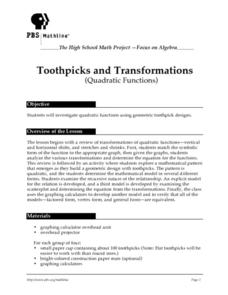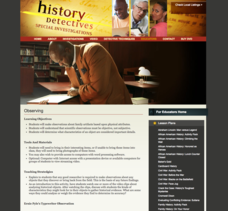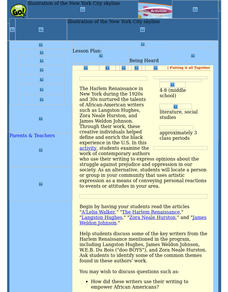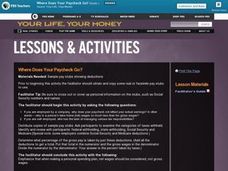PBS
What Is Money?
Early learners participate in a bartering activity during which they make connections to money and consumer concepts. They simulate buying and selling situations with one another then visit an exhibit at the Federal Reserve Bank of...
PBS
African-Americans in the American West
Secondary learners explore the westward movement of African Americans. Segmented into four time periods, the lesson provides an overview of how African Americans experienced westward expansion. Learners view PBS specials on the westward...
PBS
Looking for Lincoln Throughout His Life
Young historians gather information about Abraham Lincoln through a variety of activities. They match vocabulary words with pictures to create a timeline. Additionally, learners read books and articles that teach them about Lincoln's...
PBS
Unemployment in Elkhart
Fifth to eighth graders explore reasons for and solutions to unemployment. They begin by making a list of luxury goods and discuss why sales of luxury goods would slump in times of unemployment. They then explore infrastructure and why...
PBS
Toothpicks and Transformations
Students investigate quadratic functions using geometric toothpick designs. They review transformations of quadratic functions-vertical and horizontal shifts, and stretches and shrinks. Students match the symbolic form of the function to...
PBS
Conceptualizing an Experiment
Students analyze information from a variety of sources in order to create a hypothesis about the origin of an interesting family artifact. They create alternative hypotheses based upon available information in order to understand that...
PBS
Classification
Students explore classification skills used in scientific research. They classify a variety of objects in order to compare and contrast. In addition, they analyze previously collected data in order to place items into meaningful groups.
PBS
Predicting/Making a Hypothesis
Students analyze information from a variety of sources in order to create a hypothesis about the origin of an interesting family artifact.They create alternative hypotheses based upon available information to demonstrate that some...
PBS
Scavenger Hunt
Learners conduct field research of a historical site in order to discover a more complete understanding of a time period. They visit a site of historical significance and complete a scavenger hunt about the area.
PBS
Observation
Learners study making scientific observations . They conduct a "field study" in their attic and make observations about their family artifacts based upon physical attributes. In addition, they determine what characteristics of an object...
PBS
Interviewing a Parent
Students complete a personal interview in order to discover important information about family history and interesting family artifacts.They analyze statements from the interview in order to prove the accuracy of these statements, as...
PBS
Written in Stone
Students explore history through a tour of a local cemetery. Students investigate tombstones for historical information, make stone rubbings, and use this secondary source reference to obtain primary sources.
PBS
Taking a Field Trip
Students examine the importance of taking a field trip. They make predictions and practice making environmentally sound decisions. They watch a video clip about enhancing historical experiences.
PBS
The March on Washington and Its Impact
High schoolers read Martin Luther King, Jr's speech that he gave in Washington. They identify the social conditions that led to the civil rights movement. They discuss the significance of the March on Washington.
PBS
Home, Sweet, Home!
Students investigate the local history and architecture of their community. They draw maps, conduct Internet research, discuss varied architectural designs, take a walking tour of their town and work in teams to record their community's...
PBS
Being Heard
Examine the work of contemporary authors who use their writing to express opinions about the struggle against prejudice and oppression in our society. A short lesson on the Harlem Renaissance introduces learners to the most prominent...
PBS
Primary Sources
Students see how to use primary and secondary sources to investigate history. Whether it is a photograph, book, map, letter, postcard, newspaper, or official document, students can use sources to reconstruct and relive history.
PBS
America's Infrastructure: Miller Center National Discussion Debate Series
Junior high and high school learners study infrastructure and its relationship to the current economy. They review handouts, watch a PBS clip, and review case studies in order to answer provided questions and role play over their views...
PBS
The Housing Crisis: GDP, Housing Bubble, Recession
Secondary pupils examine the housing bubble and the 2008 and global economic crisis. Defining GDP and GDP growth, recession, and bubbles, young economists debate what makes a bubble and how housing can be an economic indicator. Small...
PBS
Looking for the Bottom
Secondary learners explore the economic indicators and the role they play in the US economy. Written for the 2008 economy, the lesson is adaptable to today's economic situation. Pupils discover economic indicators, analyze charts,...
PBS
Financial Crisis Glossary
Secondary learners explore the background and vocabulary surrounding US and global economic crises. Originally, the lesson was written to address the 2008 economy, but the material and information is easily adaptable to today's economy....
PBS
Where Does Your Paycheck Go?
Upper elementary learners explore the concept of taxes taken out of an employee's paycheck. As they work through this activity, young mathematicians discover the difference between gross pay and net pay. They also see what types of taxes...
PBS
Analyzing the Candidates in the 2008 Presidential Election
High schoolers research the 2008 presidential candidates and the required process for becoming an American presidential candidate. The class discusses both the process and the candidates, and some of the reasons someone might want to run...
PBS
Could You Start a Business?
High schoolers learn how a business starts and finds financial independence. For this lesson, students learn the struggle of financial management, the costs of running a business and how to keep a budget.

























